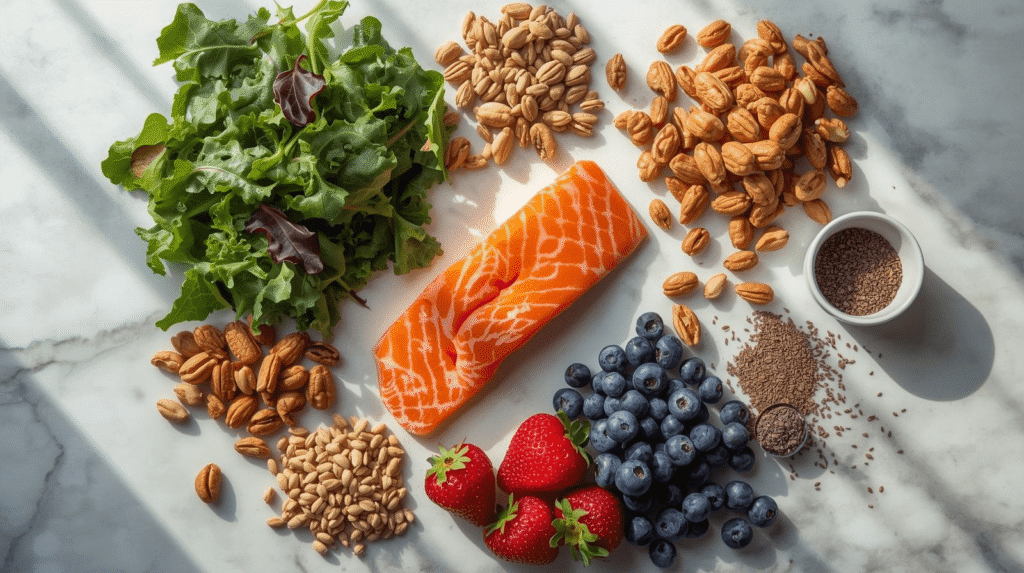Introduction
Tips to control menopause weight gain are something nearly every woman seeks during midlife. As menopause sets in, many notice stubborn pounds creeping in, especially around the belly. Hormonal shifts, slower metabolism, and lifestyle changes make managing weight harder than it was in earlier years. On top of that, menopause and insulin resistance can quietly work against efforts to stay lean.

The good news? With the right strategies, it’s possible to regain balance, improve health, and feel confident again. This guide explores the 10 best tips to control menopause weight gain from diet and exercise to lifestyle and natural remedies.
What Causes Menopause Weight Gain?
Weight gain during menopause is largely due to menopause and hormonal changes. As estrogen levels drop, fat distribution shifts, with more weight accumulating around the abdomen. Muscle mass also declines, leading to a menopause and slow metabolism effect.
Additionally, many women experience menopause and insulin resistance, making it easier to store fat even with the same diet as before. Understanding these changes is the first step toward applying effective tips to control menopause weight gain.
Diet Tips for Menopause Weight Gain
One of the best tips to control menopause weight gain is to focus on diet. Here are practical adjustments:
- Increase protein: Lean meats, eggs, beans, and tofu help preserve muscle.
- Load up on fiber: Whole grains, fruits, and vegetables support satiety.
- Choose low-GI foods: They stabilize blood sugar and reduce cravings.

Some of the best foods for menopause weight gain management include leafy greens, salmon, flaxseed, and cruciferous vegetables.
Exercise for Menopause Weight Gain
Regular activity is essential for managing weight and energy. Exercise for menopause weight gain should include:
- Strength training to preserve lean muscle
- Cardio for heart health and fat burning
- Yoga or Pilates to reduce stress and improve flexibility
Exercise also helps reduce belly fat and boosts mood, making it one of the most effective tips to control menopause weight gain.
Menopause Belly Fat Solutions
The abdominal area is one of the toughest spots to manage. Effective menopause belly fat solutions include:
- Resistance training to build core strength
- Reducing sugar and refined carbs
- Practicing mindful eating habits

Women often ask how how to lose menopause belly fat. The truth: it requires a mix of exercise, diet, and stress management.
Lifestyle Changes for Menopause Weight Gain
Sometimes, it’s not just about food and workouts, habits matter. Key lifestyle changes for menopause weight gain include:
- Prioritizing 7–8 hours of quality sleep
- Limiting alcohol and processed foods
- Practicing mindfulness or meditation
How to Stop Weight Gain During Menopause
To stop weight gain during menopause, consistency is crucial. Combining small daily changes like eating balanced meals and staying active can help prevent steady weight creep.
Natural Remedies for Menopause Weight Gain
While no single supplement is a magic fix, natural remedies for menopause weight gain can complement a healthy lifestyle. Examples include:
- Herbal teas like green tea for metabolism support
- Omega-3s for hormonal health
- Vitamin D and calcium for bone and metabolic strength
These are most effective when combined with diet and exercise.

Best Foods for Menopause Weight Gain
Food choices can directly support hormone balance. The best foods for menopause weight gain management include:
- Salmon and fatty fish for omega-3s
- Flaxseed and chia seeds for plant-based hormone support
- Cruciferous vegetables (broccoli, kale, Brussels sprouts) for detox support
By linking menopause and hormonal changes to diet, women can create a menu that works with their bodies instead of against them.
Stress, Sleep & Hormonal Balance
Stress hormones like cortisol encourage fat storage, especially around the belly. Pair that with poor sleep, and the result is more weight gain. Addressing menopause and slow metabolism often requires improving rest and reducing stress triggers.
Mindfulness, yoga, and creating a calming bedtime routine can help restore balance.
Long-Term Tips to Control Menopause Weight Gain
Short-term fixes rarely last. The real key is adopting long-term tips to control menopause weight gain, such as:
- Building a sustainable workout plan
- Sticking with balanced meals rather than fad diets
- Tracking habits to stay consistent
These best ways to control menopause weight gain ensure not only better health but also renewed confidence.

FAQs on Menopause Weight Gain
Q1: Is weight gain normal during menopause?
Yes, many women gain weight due to hormonal shifts and slower metabolism.
Q2: What are the best foods for menopause weight gain management?
Leafy greens, lean proteins, salmon, and flaxseed are top choices.
Q3: How to stop weight gain during menopause naturally?
Focus on balanced meals, regular workouts, and stress management.
Q4: Does menopause cause slow metabolism?
Yes, reduced estrogen and muscle loss often slow metabolism.
Q5: Is menopause linked to insulin resistance?
Yes, menopause and insulin resistance are closely connected, which can increase fat storage.
Conclusion
Managing midlife changes doesn’t have to feel overwhelming. By following these 10 best tips to control menopause weight gain, women can reclaim their health, reduce belly fat, and regain confidence. From eating nutrient-rich foods and exercising smartly to embracing natural remedies and better sleep, every step counts.
Remember, the most powerful tips to control menopause weight gain are sustainable ones. With consistency, the results go beyond the scale, leading to more energy, better health, and lasting confidence.
Related Articles
Menopause Weight Gain Solutions
Menopausal Weight Gain: 10 Effective Reasons
High Blood Sugar Weight Gain

